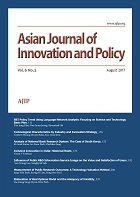 ISSN : 2287-1608
ISSN : 2287-1608
Promotion of Technology-based Start-ups: TIPS Policy of Korea
Abstract
The key conditions for the promotion of innovative technology-based start-ups are expanding the market for innovative technology products and services, increasing equity-based funding opportunities, promoting the commercialization of technological innovation, and establishing a fair-trade system for start-ups to compete fairly in the market. Besides, there is a need for a support system that minimizes the cost of failure in case of business failure to facilitate re-challenge and provides education and training opportunities to enhance entrepreneurial capabilities. To activate technology-based start-ups, the Korean government introduced the TIPS policy in 2013. It is a program that creates technology start-up with private investment led by successful venture entrepreneurs, which has shown remarkable achievement and is regarded as the most successful policy in this field up to now. The most critical factor contributed to the success of this program is to invite private investors to select a technology entrepreneurship team and provide mentoring with the investment. The government provides R&D funding with matching investment, commercialization and marketing support to ensure that technology start-ups survive crossing the death-valley. Subsequent investments from domestic and abroad investors are actively made and it is becoming a representative technology-based start-up program in Korea.
- keywords
- TIPS, technology-based start-up, fair trade system, commercialization of technology, re-challenge, entrepreneurial university
Reference
Chen, C.J. (2009) Technology commercialization, incubator and venture capital and new venture performance, Journal of Business research, 62(1), 93-103.
Deeds, D.L., DeCarolis, D. and Coombs, J. (2000) Dynamic capabilities and new product development in high technology ventures: an empirical analysis of new biotechnology firms, Journal of Business venturing, 15(3), 211-229.
Dyer, J.H., Gregersen, H.B. and Christensen, C. (2008) Entrepreneur behaviors, opportunity recognition, and the origins of innovative ventures, Strategic Entrepreneurship Journal, 2(4), 317-338.
Gimmon, E. and Levie, J. (2010) Founder's human capital, external investment, and the survival of new high-technology ventures, Research Policy, 39(9), 1214-1226.
Hyytinen, A., Pajarinen, M. and Rouvinen, P. (2015) Does innovativeness reduce startup survival rates?, Journal of Business Venturing, 30(4), 564-581.
Kim, H.K. and Kim, C.K. (2018) The effects of network between business founder and investor on enterprise performance: focused on TIPS support business, Asia-Pacific Journal of Business Venturing and Entrepreneurship, 13(3), 47-57.
Li, H. and Atuahene-Gima, K. (2001) Product innovation strategy and the performance of new technology ventures in China, Academy of Management Journal, 44(6), 1123-1134.
Lee, C.Y, Hwang, I.H. and Kim, J.S. (2016) The influential factors to frowth intention and performance in early-stage technology-based start-up companies, Asia-Pacific Journal of Business Venturing and Entrepreneurship, 11(2), 49-62.
Porter M. (1990) The Competitive Advantage of Nation, Palgrave MacMillan
Souitaris, V. and Maestro, B.M. (2010) Polychronicity in top management teams: the impact on strategic decision processes and performance of new technology ventures, Strategic Management Journal, 31(6), 652-678.
- Downloaded
- Viewed
- 0KCI Citations
- 0WOS Citations

